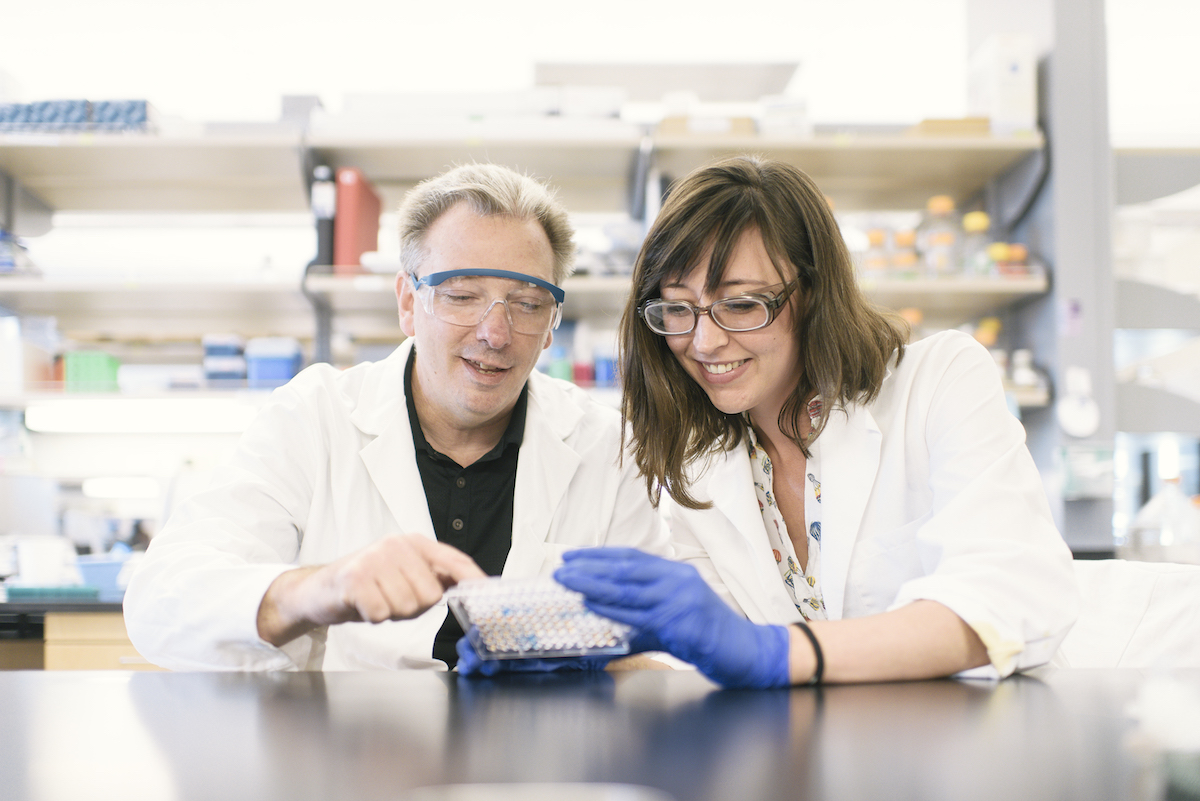Purdue University Center for Cancer Research
Member Spotlight
ANDY MESECAR, PhD
Walther Professor of Cancer Structural Biology
Deputy Director, Purdue University Center for Cancer Research
Head, Department of Biochemistry
Another Walther Success: Anti-Cancer Theraputics

The Walther Cancer Foundation’s close connection with Indiana’s academic research centers gives the foundation insights into the promising cancer research underway here. Leveraging connections with researchers at Purdue University, for example, the WCF is able to identify and support projects with the greatest potential of defeating cancer.
One such success story at Purdue is the work of structural biologist Andrew (Andy) Mesecar.
In 2010, funding from the WCF enabled the Purdue Center for Cancer Research (PCCR) to recruit Mesecar to complement the cancer research efforts underway at Purdue. As the Walther Professor of Structural Biology, Mesecar specializes in designing small molecule compounds that can be used as anti-cancer therapeutics.
He also serves as deputy director of Purdue’s Center for Cancer Research. When Mesecar was hired, Purdue’s Center for Cancer Research was going through administrative changes suggested by the National Cancer Institute, one of which was to create a deputy director position, someone to help Director Tim Ratliff carry out his mission and his vision. “I had already accepted the position at Purdue, and Tim approached me about being the deputy director. He was very persuasive and that’s how I came to fill the role,” he says.
“That was over 7 years ago and I’m still happy serving as the deputy director. I continue to be an active researcher, doing discovery for anti-cancer agents. The Walther investment in Purdue is what led me here and what basically has captured my focus, my attention, and has become my personal mission to continue work in anti-cancer therapies.”
He has a number of active projects that involve anti-cancer drug discovery. Mesecar and his team first work to decipher the 3-dimensional structures of anti-cancer protein targets, enzymes in particular, and then they hunt to find small molecule compounds that will inhibit these enzymes.
Employing huge compound libraries available at Purdue, Mesecar’s team searches through thousands of compounds in search of those that produce the desired biological effect against cancer-causing enzymes. “We employ automated robots using biochemical assays aimed at finding the inhibitors of enzymes that are the therapeutic targets for a particular type of cancer,” he says.
Currently, he’s focused on discovering therapeutic targets for prostate and breast cancer as well as multiple myeloma.
Prostate cancer
It was Purdue Center for Cancer Research Director Tim Ratliff and Professor Graham Cooks who discovered the role of an enzyme called cholesterol sulfotransferase (CS) in prostate cancer cell proliferation. In collaboration with Ratliff, Mesecar has discovered small molecule compounds that inhibit the CS enzyme, which is highly upregulated in prostate cancer. The idea was to find a drug that would knock out the enzymatic activity of CS in prostate cancer cells.
Over the last three years, with funding from a Department of Defense grant, Mesecar has discovered inhibitor compounds for the CS enzyme. He and his team are now working to improve the potency of these compounds, in hope of providing a drug to stop prostate cancer. These inhibitors are being targeted against the proliferation of castration-resistant prostate cancer cells.
“The discovery of cholesterol sulfotransferase and its involvement in prostate cancer was done here at Purdue,” Mesecar says, “Now we are developing compounds that will inhibit that target enzyme. It’s becoming another one of our success stories.”
And it is a story that could not have been told without the initial scientific understanding and financial support of the Walther Cancer Foundation.
Multiple myeloma
Another of Mesecar’s projects is targeting an enzyme for multiple myeloma. He is excited about an emerging new class of enzymes called ubiquitin-specific proteases, known as USPs. The human body has about 58 of these enzymes. It so happens that of these enzymes, USP7 is produced in large amounts in patients with multiple myeloma, and the survival rate is lower for patients with increased levels of USP7. Mesecar and his team have targeted this USP, and several others, for development of anticancer compounds. And they have found one.
“Our new USP7 inhibitor is a big discovery,” Mesecar says. “It is especially exciting, because we have tested it in over 30 other USPs and see no other inhibition.” The team is submitting a paper on their discovery and has a provisional patent — which Mesecar hopes will turn into a full patent.
Commercializing enzymes
Mesecar and his team are performing similar types of work with other USPs, including USP17, which is involved in a number of cancers. “We’re the only ones right now, on the planet, that can actually produce this enzyme.” Through Purdue, the team recently made an agreement to provide their enzyme commercially. “That way, other scientists can try to target this anti-cancer enzyme, too.”